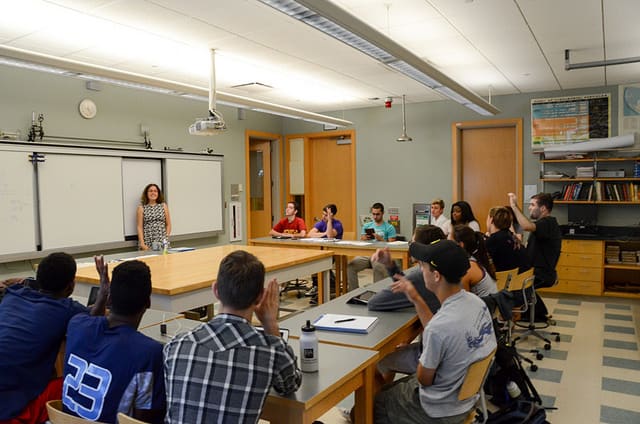by Principal Brad Weinstein.
Picture this… The teacher is doing a lesson on something new and you are sitting there wondering if your classmates are also a little confused. Of course, you assume that you are one of the only ones who doesn’t get it, so you don’t raise your hand to avoid embarrassing yourself. What you don’t realize, however, is that many of your classmates are feeling exactly like you…confused, overwhelmed, and a little frustrated.
Rewind back to your childhood when you first tried to ride a bike. It looked so easy when your older siblings or friends did it, yet you feared even getting up on the seat. Once you built up the courage to try, you failed many times to steer, balance, and control the bike. Ultimately, your perseverance and grit paid off, and you were able to eventually ride the bike like it was second nature. Learning, in any form, is the same way. As Thomas Fuller said, “All things are difficult before they are easy.”
Sure, some kids might have gotten the content or grasped riding a bike faster than you did, but there is a secret that you need to know about many of those who get things quickly…when they don’t get it quickly, they give up. Many students who are considered quick learners build their identity around how naturally smart or talented they are. They are used to things coming easily and not having to work as hard as others. The problem with this, however, is that once they face an obstacle that is not easily and quickly overcome, they do not know what to do. They get frustrated, feel bad for themselves, and sometimes give up. This is what is known as a fixed mindset. According to world-renowned Stanford University psychologist Carol Dweck, fixed mindset is when “people believe their basic qualities, like their intelligence or talent, are simply fixed traits. They spend their time documenting their intelligence or talent instead of developing them. They also believe that talent alone creates success – without effort. They’re wrong.”
The opposite of fixed mindset is growth mindset, which is the belief that hard work and dedication are the keys to getting better at things. For example, the team with the most athletic players would seem like it would win the championship each year in its respective sport. What happens, however, is that many players that are naturally athletic rely heavily upon their athleticism instead of developing their basic fundamentals. Once things do not go as well as planned in a game, they have nothing to fall back on and get outmatched by their opponents.
The famous phrase, “Hard work beats talent when talent doesn’t work hard” by high school coach Tim Notke also applies to academics. It is when you go the extra mile, study hard, seek help, and never give up. Instead of getting frustrated when you don’t get something or get a bad grade, see it as opportunity for improvement. If you give up on something, it will only get worse with time as you usually need to understand the lesson or concept you are currently working on in order to understand the next lesson or concept coming up.
Below, I have listed some specific strategies that the most successful students – not always meaning the most naturally talented students – do to increase their chance of success:
- Successful students plan: Your life is very hectic as a student with homework, house chores, sports, activities, and more. You need to keep a calendar (or use an online one) with all of your responsibilities and plan out when you will study or do homework. You also should be sure to schedule in some time to relax and have a little fun!
- Successful students study smartly: Cramming for a test is a very stressful and ineffective way to prepare for a test. Instead, study each subject for at least a few minutes a night. This way, you will be able to identify weaknesses in your comprehension in advance of the test, which gives you enough time to get help from your teachers or others who can help you. It is also important to actually study in an effective way. One of the best ways to study is to take the material you are learning and create your own test questions. By doing this, you are identifying the most important information, and also banking the information internally into your memory.
- Successful students don’t give up: As mentioned above, many students struggle with material at first, even if they don’t say it aloud. Seeing others give up is no reason for you to join them! Give the new material a chance and work over and over again to master it, especially if it is difficult. Also, be sure to ask your teacher questions, or anyone else you can get help from. Many teachers will stay after school, come in before school, or find other ways to help you. You need to ask! You might also start study groups or identify some strong students to get help from.
- Eat healthy and get enough sleep! The brain doesn’t work effectively if it is tired or not getting proper nutrition. Avoid junk foods and staying up late, especially the night before important tests or activities at school.
About the author: Brad Weinstein is Principal at Irvington Preparatory Academy, Indianapolis USA. He focuses on cultivating a supportive, rigorous, and safe learning environment, promoting critical thinking, creativity, and technology integration with students and staff.
Brad has a bachelor’s degree from Purdue University in Elementary Education and a master’s degree from Indiana Wesleyan in Curriculum and Instruction, also graduating from the Post-Master’s Principal Licensure Program through Indiana Wesleyan. As well as teaching middle school Science for nine years, he has served in many leadership roles including a principal internship, developing curriculum and instruction, coaching, and promoting innovative instruction to reach 21st century learners.
You can follow Brad @teachergoals or @WeinsteinEdu.
Photo: AnnMarie Thomas - Upper School by Friends' Central School under Creative Commons license




